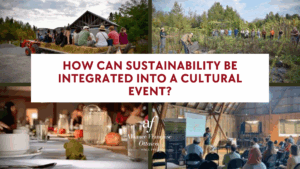How can sustainability be integrated into a cultural event?
@Photo credit: Alimentation Juste & Régénération Canada
- Why talk about sustainability in culture?
The world of events is changing. Today, it is essential and urgent to rethink our practices in the light of environmental and social issues. As cultural centres, and even more so as committed Alliance Française, it is our responsibility to design events that take into account their impact on the planet and on society.
Organising an eco-responsible event means making choices that maximise the positive effects, while reducing the negative impacts. It also means integrating the principles of sustainable development at every stage: before, during and after the event.
- An observation: culture is still too silent
The cultural sector still pays too little attention to environmental issues, even though it could be a powerful lever for change.
A study by the Conseil québécois des événements écoresponsables reveals that transport alone accounts for 80% of greenhouse gas emissions linked to an event. Closely followed by food.
The transport sector is involved at every level: moving the public, artists, technicians, equipment or works of art… Often by road or air.
While the big festivals are often singled out for criticism, it should not be forgotten that all cultural structures, even the smallest, have a role to play. From conferences to film clubs, intimate concerts to children’s workshops, every event has an impact. And every structure can do its bit.
- The responsible event guide: a practical tool for the Alliances
With this in mind, in 2024 a group of five members of the Alliances Françaises network from all over the world co-authored a guide to responsible cultural events. This document, designed as an evolving tool, is available to all the Alliances throughout the world.
It proposes a series of concrete actions, organised around several major themes:
– Preparing for the event
– Venue and mobility
– Communication and awareness-raising
– Partners and community
– Food and drink
– Furniture and equipment
This guide does not seek perfection. Its purpose is to suggest ideas, ask questions and provoke thought. Each Alliance can draw on it according to its resources human, financial, time and the realities of its territory.
- Three levels of commitment
An eco-responsible approach can be built up gradually according to the following levels of commitment:
– Becoming aware: being informed, raising awareness, starting to question our practices and considering more sustainable alternatives.
– Taking action right from the design stage: integrating eco-responsibility into the planning phase (choice of venue, service providers, limiting travel, sustainable materials, etc.).
– Change your habits: make these choices a standard, integrated into every stage of the organisation.
The guide to responsible events, designed by and for the Alliances Françaises, suggests appropriate levels of action for each theme, taking into account their feasibility and potential impact. The ‘tips’ and ‘examples’ sections provide inspiration and facilitate implementation.
- Example: printed communication
Let’s take a concrete example.
Paper communications consume massive amounts of resources:
– 165 litres of water
– 10 kg of CO2
– 6 kg of waste for 1,000 standard prints.
(Source: Print eco, 2022)
Then there’s the digital impact: a single data centre can consume more electricity than a medium-sized town. So the solution is not necessarily ‘all digital’, but rather a conscious and balanced approach.
There are three possible levels of action:
1.Reduce: print less, double-sided, with economical fonts, on recycled paper, using vegetable-based inks.
2.Choosing better: opt for eco-responsible printers, use reusable materials for signage, think about reuse from year to year.
3.Go paperless: go all digital with online registrations and programmes, while choosing energy-efficient platforms.
- An evolving guide to sustainable culture
This guide to responsible events in cultural administrations and centres is not an end in itself. It is designed as a living tool, which will evolve with feedback, new issues and emerging practices.
It is part of a clear vision: to make culture more sustainable, more inclusive and more aware.
And if the Alliance Française is a driving force for the French-speaking world around the world, it must also be a driving force for the ecological transition.
Tomorrow’s cultural commitment cannot be achieved without sustainability.


